
 Lukas Mauser
Lukas MauserOpen Source Secrets Manager - Deploy Infisical on Sliplane with Docker
Learn how to deploy Infisical, an open-source secrets management platform, using Docker on Sliplane. This guide covers setting up PostgreSQL, Redis, and Infisical for secure secrets management.